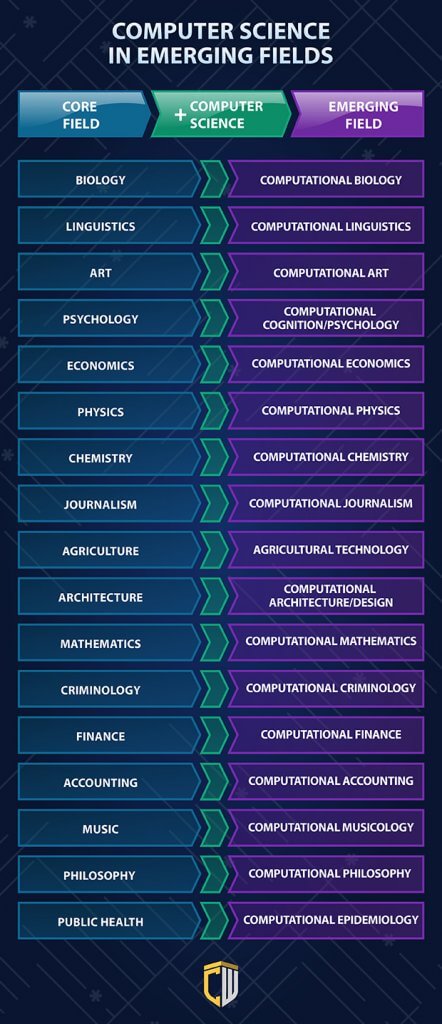“Oh, my daughter isn’t very interested in coding. She’s not that type”.
I have heard this so many times from parents that it makes me curious. When there is an opportunity, I pause and ask, “What do you mean?” Usually, they respond by saying something like, “Well, she is more the liberal arts type or life sciences type”.
I realized there’s a misconception that learning to code is only important for kids interested in STEM careers, but the world has quickly moved past that. Computer science has evolved way beyond the idea of a singular field. A foundational understanding of computer programming is useful to your child, regardless of the career path they end up taking, even liberal arts or life sciences. Stephen Wolfram, CEO of Wolfram Alpha, said it best,
“Pick any field X, from archeology to zoology. There either is now a ‘computational X’ or there soon will be. And it’s widely viewed as the future of the field.”
I want to show you how computational thinking is being applied in non-STEM fields today so you can understand how computer programming can help your child, even if she isn’t interested in STEM related careers. Coding will expand the possibilities of how kids work with their passions, helping them capitalize on emerging areas of any industry.
If you have a high schooler who isn’t quite sure what to major in during college, this article can help expose them to many emerging fields in the hopes that at least one of them will be exciting enough to catch their imagination.
Computer science brings pre-existing fields of study to the next level, helping experts broaden and deepen their work. Below are a few examples of emerging fields based upon combining established fields with computational processing. These are only a few examples. In reality, the possibility for new discoveries is limitless.
Computational Criminology
Criminology is the study of crime. While this might call to mind forensic science and medical analysis, computer science is helping professionals in the field fight crime.
So how does it work?
According to the Technical Committee on Computational Forensics, computational forensics uses computational methods to model, simulate, analyze, and solve forensic problems. For example, professionals might use digital recreations of a crime scene based on available data to help judges picture a scenario more clearly, or even modeling how the characteristics of a city affect urban crime rates.
Simulating these scenarios requires more than just a passion for forensics or the law. You need knowledge on how to craft computational models of real life crime, which calls for data experts and coders.
Cyber-forensics is a growing field where people with these skills assist criminal investigations to help close cases better and faster. In the future, a degree in criminology or a willingness to fight crime alone might not cut it. Instead, you’ll need a better, computer science-based understanding of how to bring down crime rates.
Computational models are revolutionizing the criminology field by preventing crimes before they even happen, or showing compelling evidence in a more understandable format.
Computational Health Science
Health science has been around for as long as humans have studied their own health and how to improve it. Tools like MRI scanners and ultrasounds brought the patient experience to the next level. Now, it’s looking like computers might be the next big step in transforming what healthcare looks like.
Computational health science is an interdisciplinary field where people with medical expertise and coding skills conduct research through data mining, social network analysis, and more to improve healthcare.
Computational modeling can play a major role in helping researchers understand health and health behavior. Mining data from online social communities to outline their structure helps practitioners better understand the internal logic behind public health issues.
In the age of COVID-19, tracking the spread of diseases is more important than ever. Researchers have found Twitter to be a valuable tool in determining how the virus spreads through social groups, which is not only helpful in stopping the spread of coronavirus, but also useful for intercepting contaminations in the future.
Is your child interested in the medical field? Learning coding can help them work at the intersection of computational science and health science, tracking outbreaks, implementing better healthcare, and saving lives along the way.
Computational Journalism
In the age of “fake news”, reliable journalism matters more than ever. But these days, journalists aren’t just braving investigations with pen and notepad in hand. Computer science has given them a whole new set of tools to find the truth.
Computer-assisted reporting is becoming more common, as reporters rely on computers to unearth and analyze data for breaking stories. On sites like FiveThirtyEight, journalists document news through their connection to data. Sources like these are only becoming more and more common, pointing to a larger push within journalism toward data-driven news.
More data means more information to put an individual story into context, making for better storytelling. Outlining patterns through data is more accurate than guesswork, hunches or inconclusive evidence that journalists might have been forced to use otherwise.
Computational technology is also useful for visualizing trends for an outsider audience, helping journalists introduce their subject in a more clear, efficient manner.
At the end of the day, computational journalism could be about more than just better reporting.
“If you look across the country, there are…[organizations] making decisions and nobody is watching,” said Jay Hamilton, Hearst Professor of Communication and director of the Journalism Program in a moderated discussion at Stanford, “So I think that’s something where computational journalism can make a real impact. If you have a strong interest in engineering and data, try to help us figure out the stories that go untold, especially at the local level.”
Computational Linguistics
At first glance, linguistics seems like the furthest topic from computers. Language is complex, rich, human. So, how can computers help us break that information down?
Surprisingly, computational approaches are helping linguists decode questions at a brand new scale. Applying artificial intelligence to language has been the key to developing increasingly accurate machine translations, summarizing or analyzing text via emotion or keywords.
While some computational linguists are more concerned with theoretical linguistics, playing with the rules of syntax at a distance, others might develop algorithms from their understanding of linguistics to break down text. With the help of a computer, you can go big or small in scale: scanning thousands of texts to instantly find patterns or uncover the hidden emotional intent behind certain linguistic choices.
Language is ultimately both an art and a science, and the better we can understand it as a science the more appreciation we’ll gain for it as an art.
Computational Agriculture
Agriculture has already come a long way from farmers simply plowing the field to make a living. Nowadays it’s also a science dedicated to studying how to best cultivate crops, making food better and faster than ever possible.
While tools like location or optical sensors are popping up to track the properties of soil, positioning, plants, and more, this information wouldn’t be useful without a way to analyze it.
That’s where an agritech professional steps in. Farmers need better data on how to feed more people. With the computing capabilities of a machine on their side, a computational specialist can analyze the data on a field and look for ways to reduce pesticide usage, improve crop quality, and simplify the harvesting process.
Agriculture is another example of a very old industry embracing transformation through technology. Learning coding is a great way to pave the path for anyone who’s interested in combining an interest in data with sustainability or better foods.
Computational Art
When we think of art, we think hands-on. Ancient sculptors carved their work by hand. Painters spent years in studios layering brushstroke after brushstroke on a canvas. So how are virtual spaces relevant for artists?
At its roots, art is about creativity. A computer is just another tool to express creative visions.
While most of us have probably only doodled in M.S. Paint, computational artists rely on far more sophisticated tools. Coding is how they can generate original patterns or illustrations in a completely virtual environment, creating something impossible to craft by hand. Even if they’re more inclined to having a physical practice, tools like 3D printers, robotics, computer-generated textiles, laser cutters, and more are revolutionizing how precisely an artist can bring their work to life.
Is your child an aspiring artist? They’ll be interested to learn how modern technology can bring their ideas to the forefront. Understanding computer logic is the first step toward a much more expansive canvas.
Computational Biology
Collecting large quantities of data in a short amount of time is now easier than ever. Bioinformatics, the study of creating tools to break down large quantities of complex biological data with the assistance of computers, has been around since the 1950s.
Computational biology parallels bioinformatics but refers more specifically to the process of analyzing and reviewing biological data. Simulating biological relationships, structures, and genomes has helped researchers accomplish feats like sequence the human genome.
Instead of spending years collecting more data through lab work, biologists can select data sets related to their topics of research to analyze. Biology has always been about the interconnectedness between systems and species. Computational biology is just a better tool for future biologists to understand how everything fits together.
Computational Architecture/Design
Architecture is already an interdisciplinary field. You need knowledge of design, psychology, art, and mathematics to construct a building that’s not just aesthetically pleasing, but also solid.
A tech-savvy architect can make use of programming to pull together their best design work. Computational design depends more on visual programming rather than text-based coding, letting architects explore more design options, combine data with visualizations, and simulate building performance by running environmental tests.
Computational Psychology
What can we know about the human psyche? If your child wants to work in psychology, this is the question they’ll confront every day at work. How can computers help us understand our own minds?
Surprisingly enough, technology like artificial intelligence and neural network modeling is adept at modeling the mathematical system of human minds.
People are not machines, but our world is constructed on the basis of symbols almost similar to how a computer works. Computers don’t seek to replicate the complexity of the human mind. What they do is represent our mental processes through modeling.
Through computational psychology, even emotions or perception can be simulated with computers, providing psychologists a better understanding of what might motivate certain human behaviors. Having a grasp on coding will help any aspiring psychologist become proficient with computer-based tools for understanding cognitive behavior.
Computational Physics
Physicists have been using computers in research since the 1940s, simulating the performance of ballistics and nuclear weapons as well as fluid dynamics. Nowadays computation has application in both theoretical and experimental physics, used not only to model systems but also for complex calculations within the framework of those systems.
In physics, mathematical models are essential to predicting how systems behave. At the same time, solving the math doesn’t mean that you’ve cracked the case on useful predictions.
Sheer complexity means that the mathematical model doesn’t always accurately represent reality. In these cases, a computer can perform approximate calculations far more accurately than a person.
Physical experimentation is rarely the most useful way to examine system behavior. Understanding how to use computational tools like MATLAB is essential for almost every major branch of physics, from fluid dynamics to astrophysics.
Computational Chemistry
While a good deal of chemistry work happens in the lab, computational programs are assisting chemists in uncovering new chemical phenomena, especially in fields with well-established mathematical methods.
You can run calculations on molecule structure, size, energies, reactivity, and more. Computers can optimize how you synthesize compounds based on possible relationships. They’re also used to calculate or predict chemical properties and interactions, which is especially useful in developing life-saving drugs.
A computational chemist bridges the gap between theoretical and experimental chemistry, whether it’s simulating experiments to justify a new study or breaking down previously synthesized data. They collaborate with lab researchers in identifying reaction pathways, simulating chemical processes, estimating likely products, designing experiments, and whatever else their work responsibilities call for. With the wider availability of data in the world of chemistry, computational chemistry will only grow in the future.
Computational Mathematics
Math is an ancient field that’s developed since the early days of human history. In its fundamental form it’s about finding patterns, designing conjectures, coming up with proof.
These days, everyone knows that computers are the best calculators. But the integration of computers into math is about more than just the pocket calculator on your smartphone. Computers are useful for discovering new algorithms when you have an exponential amount of variables to take into account, accounting for massive quantities of data in the study of statistics, and automatically proving theorems with computer programs.
Since mathematics itself forms the basis of several other sciences, it should come as no surprise that learning computational mathematics has broad applications across fields like logistics, business analytics, computer engineering, banking, medical research, and more.
Computational Finance
Computational finance is a great example of a field marrying computer science, math, and financial studies for practical applications.
When you think of Wall Street, what comes to mind is probably the image of people monitoring stock prices throughout the day. Thanks to computational finance, this is far outdated. Nowadays your average trader relies on algorithmic trading, wherein computer programs follow predefined instructions based on timing, price, quantity, or anything else you can express through mathematical models. It’s instantaneous, responding far faster to market changes than any individual can.
You still need a great understanding of market trends and the computer know-how to put together an algorithm that operates your trading for you. People with knowledge in computational finance can find great success in financial research or strategizing, risk management, sales, and more.
Recommended: Python Classes for Kids and Teens
Computational Musicology
“Music is the literature of the heart; it commences where speech ends.”― Alphonse de Lamartine
Do you like music? Chances are, you’ve enjoyed computer-generated sound. Even setting aside algorithmic composition, human musicians are using artificial intelligence in their art. After “listening” to enough source material, computers analyze the common patterns in music (e.g. chords, length, tempo, melody) and generate their own output. While computers are still not ready to generate outright hits, they’re advanced enough to create music indistinguishable from human creations.
The actual study of musicology is also delving more into computer science. Computers can analyze music far more efficiently than the human ear, picking up on the evolution of musical style throughout a given time period.
Whether you’re interested in music as a general course of study or from a musical standpoint, computers are a great tool in expanding your understanding of music and will only become more relevant to the art and science of the field.
Computational Philosophy
Philosophy is another ancient study that’s been around for millennia. Ever since humans have been able to think, we’ve wanted to understand why we are here, what we can do, how to define the parameters of morality.
Math and logic are the underpinnings of philosophy, so it should come as no surprise that computers aid philosophers in proof-checking the same way they do with mathematicians. The basis of philosophical theory can be stripped down to functions and logics, and computer programs can examine the internal soundness of any proof if it’s converted into a mathematical formula.
Cognitive science, which has a good deal of overlap with philosophy, draws heavily on computational programs to predict human behavior. Using this information to infer on topics such as free will is yet another form of proof for a philosopher’s argument. Computational philosophy is a driving force advancing this classical field in more complex ways than it has ever progressed before.
Computational Epidemiology/Public Health
Epidemiology is a cornerstone of public health, and the main focus of computational aspects of the public health field. It involves studying determinants and patterns of public health such as disease.
Just like the aforementioned computational health science, where scientists can mine information from social media to track the spread of disease, public health professionals are able to do similar tasks to better stop infections from spreading quickly. Using large sets of data usually collected via computer, they generate mathematical models concerning a disease/infection. Running simulations can help predict the multiple possible outcomes within a given environment. This information can be crucial not just for public health policy, but also for politicians looking to implement relevant policies.
At the moment, researchers are using simulations to study the spread of COVID-19 so countries can combat the virus more effectively with preventative measures. Knowing what to focus on is the first step in a good intervention strategy, and without the programming knowledge public health officials might have difficulty formulating a strategy.
So What is Coding Good For?
Coding skills aren’t just useful for helping your kid land a job as a software engineer. No matter what they’re interested in, coding literacy is a relevant skill.
At CodeWizardsHQ, we believe coding prepares kids for success in a digital future. They’re able to learn programming, problem solving, and logistical thinking in an exciting hands-on environment that does more than teach them the basic principles. It teaches them how to apply them. And unlike so many video based programs, our coding classes, for elementary, middle, and high school, are live and provide extensive out of the classroom support.
Knowing how to code will help them tap into emerging areas of fields that already exist and thrive in ways none of you might have thought possible. Put simply, it’s a way to discover new possibilities while still sticking close to their passions. It’s another tool in their toolkit that will help them succeed in the world of the future.




